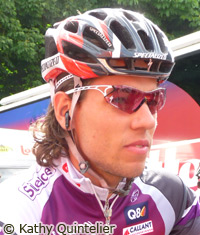 Former professional cyclist Michael Boogerd has said he’s willing to help his compatriot Thomas Dekker work through the two-year doping suspension that was handed down to him by the UCI last week. The Dutchmen rode together on the Rabobank team until Boogerd retired from the sport in 2007.
Former professional cyclist Michael Boogerd has said he’s willing to help his compatriot Thomas Dekker work through the two-year doping suspension that was handed down to him by the UCI last week. The Dutchmen rode together on the Rabobank team until Boogerd retired from the sport in 2007.
“I told him that if he has difficulty or has any motivation problems, he can come stay with me for two quiet weeks at my home,” said Boogerd to the New Sportsweek.
Dekker’s December 2007 sample was re-tested because the biological passport program detected suspicious blood profiles. This prompted the UCI to retroactively examine the sample from 2007. The sample was found positive for Dynepo, a form of the banned blood-booster EPO. Dekker at first denied doping, but admitted to it after the “B” sample was also found to be positive. He accepted the decision of the UCI for a two-year ban with his return to racing set for July 1st 2011.
At the time of his positive he was riding for Silence-Lotto which then immediately fired him when his “B” sample was also positive. The retroactively tested positive sample was taken when he was under contract at Rabobank.
Boogerd realizes that for Dekker to return to the top level of the sport, he needs to stay motivated. “David Millar, Ivan Basso, and other riders came back. Thomas can also succeed. I just hope that people give him that chance and that the doping stigma does not stick to him.”
Boogerd notes that he needs to be suspended, however he deserves a chance to return to racing. “Everyone deserves another chance. Errors are made everywhere. It would be strange that you as a rider make no mistakes. Then they should also abolish the suspensions. It is useless to suspend anyone for two years and then his whole life is punished.”
The Dutchman said he doesn’t want to leave the sport on those terms adding, “I will definitely return and clear my name.”
In theory Dekker could return to the Tour de France in 2011 providing he’s able to find a team willing to bring him onto the roster, and the organizers of the race are willing to let him take part.
When Androni Diquigiovanni team member Massimo Giunti’s positive came to light, he admitted his guilt before the “B” sample was tested. He made the correct choice and is now facing the appropriate consequences. Dekker has taken the right approach to admitting his guilt and accepting his suspension. This case also points out that the biological passport system and the retroactive testing are narrowing the opportunities for dopers to escape from their sins of the past.